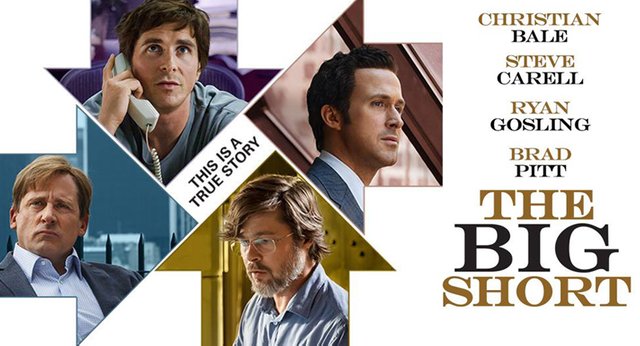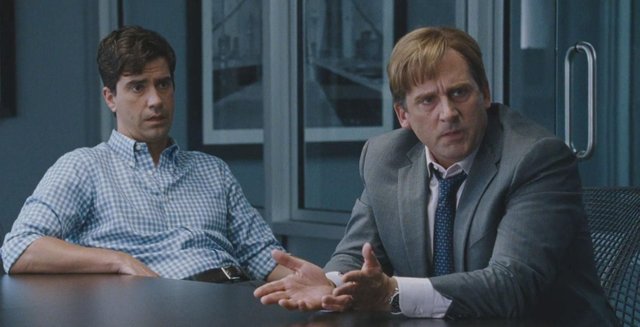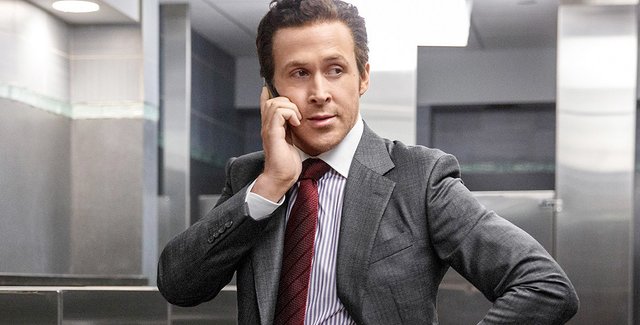🎬 The Big Short / One of the best films about Wall Street / Film Analysis

Bankers and brokers have convinced us that their work is something complex and difficult, which requires a lot of knowledge, and that we, ordinary, unskilled people, will not understand. The truth is that almost everything about their business can be learned and explained much simpler, and part of their practice that comes down to the "feeling" may be a gamble, and may be a manipulation. An example of such bank irresponsibility is the global crisis and the consequent 2008 recession, which in some parts of the world, such as the South of Europe, is still going on.
With the crisis there are also two related myths built into the foundations of the system. The first one, the one about the security that a man will pay his mortgage, revived US banking in the 1970s and created the most dominant and fastest growing branch of industry. The reason for this was bonds that contained a large number of linked mortgage debts, more profitable due to connectivity, but equally safe because they were mortgages. The second myth is metaphysical in nature, that is, the man is honest, whether he was a banker or a regular citizen, so the scam is excessive for "a few broken apples" .
This may have been the case until the needs of the buyers were satisfied and others didn't want luxury. It was not difficult for the bankers to give them mortgage loans that they would otherwise sell immediately. You could have been busy or unemployed, an immigrant, illiterate, and you could buy a first, fifth or tenth loan on a loan, a loan would be more favorable or less favorable, but certainly approved.

SYNOPSIS
(source: Shmoop)
The Big Short jumps back and forth in time more than an entire season of Quantum Leap. Whatever: we're going to rearrange things in chronological fashion, for your benefit. Cool? Let's begin.
In the early 2000s, an obscure but well-respected investor named Michael Burry makes a shocking discovery: the U.S. housing market is about to collapse. Over the past two decades, the big banks have made it a habit to bundle together Americans' home mortgages into bonds known as "CDOs," which they trade amongst themselves for higher and higher prices. The quality of those loans has been declining in recent years, however, making it likely that many CDOs will go bad.
These bad loans are known as "subprime mortgages." Increasingly, banks are targeting immigrants and other members of the working class and suckering them in with low interest rates, only to jack up the prices after a two-year grace period. That's problem number one. Problem number two? These people with bad loans can't actually pay them back once the price gets jacked. And there are more problems to come.
Convinced that the CDO market is about to crash, Burry buys something called a "credit default swap" on a bunch of CDOs, which basically means that he pays the bank each month that the CDOs retain their value, while the bank pays him each month they drop. It's like making a bet. Burry buys a ton of credit default swaps and predicts that they should start paying off in 2007.
This deal is monitored by Greg Lippmann, a bond trader with Deutsche Bank. After performing his own research to validate Burry's claims, he creates a sales pitch to entice others into buying credit default swaps from him. It doesn't work very well: everyone thinks he's crazy for suggesting that the housing market will go bad.
That is, until he meets FrontPoint Partners. Led by a cantankerous analyst named Steve Eisman, FrontPoint has been investigating the coming mortgage-pocalypse for years but has lacked a method through which to bet against subprime mortgage bonds. Enter the credit default swap. FrontPoint buys a nice grip for themselves, and there are high fives all around.
Around this time, another group enters the fray: Cornwall Capital, a tiny investment fund operated by Charles Ledley and Jamie Mai. These aimless misfits managed to make millions working the stock market, but now they've set their sights on subprime mortgages. After employing the help of their pal Ben Hockett, who helps them deal with big banks, the fellas buy credit default swaps on the highest rated portions of CDOs, a bold strategy that has an incredibly high payout rate.
In early 2007, FrontPoint Partners and Cornwall Capital go to Las Vegas for a big subprime mortgage bond conference. Both groups are horrified by what they learn about the CDO market, convincing them even further that a massive collapse is imminent.
And they're right: over the next few months, subprime mortgages start going bad all over the country. Oddly, however, the bonds that contain those mortgages are retaining their value. Huh? Michael Burry, who's been fighting with his own investors since making his first bet against the subprime market, suspects that the banks are inflating CDO prices so they can sell their own CDOs to unsuspecting victims before it's too late.
By the end of the year, the dam has broken. A bunch of major banks and financial firms go under, and even those that don't totally tank get slammed pretty hard. On the flip-side, the good guys make a bunch of money: Ben Hockett sells Cornwall's swaps while in a pub in England, while Burry sells his to silence from his investors. Eisman, on the other hand, decides to hold on to his credit default swaps until 2008.
That's when the stocks really hit the fan. When even more banks and financial firms fail, the United States government itself steps in and bails them out, effectively forgiving their losses in the subprime market. Although our main characters make themselves a lot of money, they're deeply worried about the implications this crisis will have on the future of their country—and the world.

ANALYSIS
Though it seems so, "The Big Short" is not only a dock-based drama based on a complex and unstructured factography that in a school way writes the chronicle of the crisis. In fact, it's a pitiful and funny movie that flirts with a black comedy, which at the right moments is serious as a drama and tense as a thriller, a movie that will sensitize us to our heroes so much that we can cheer for them, even though we know what will happen, and it means the collapse of the world economy, and they are not even saints and heroes, but at least they had the courage to point their fingers to the garbage that has accumulated for a long time.
"The Big Short" is a film that will keep us in doubt whether the bankers who have caused the crisis are stupid or manipulative, or simply just don't care. The film will show us the distorted relationships of power and responsibility in which everyone is dependent on one another, and by the law of connected courts, no one does their job honestly.

"The Big Short" is one of those films that often demolish the "fourth wall" and communicate directly with the audience. Actors look into the camera, but they don't get out of the character, and it's used for relaxing comic moments in the built scenes, but also for the explanations of certain economic concepts that make the film compelling, especially for a less educated viewer. A special commendation is the explanation of the key concepts for the individual stages of the film, and they are performed by celebrities in the "cameo" roles: Margot Robbie in a bath and champagne (an allusion to "The Wolf of Wall Street"), Anthony Bourdain in the kitchen explains the secret of the ship , and Selena Gomez and prof. Thaler appered in the casino.
Also, don't consider The Big Short as a kind of tendentious call to abolish capitalism or market treaty as such. The film primarily deals with responsibility and in a fun and shaky way demonstrates that complete self-regulation is not possible. Through the game with the absurd system, The Big Short represents a significant contribution to the debate on the future of democracy.
This was my translation from Croatian to English from Lupiga article ''Oklada Stoljeća'' by M.Stoiljkovic
(1)Synopsis was taken from Shmoop.com
✅ I gave you an upvote on your post!